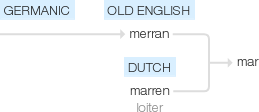Mar
Old English merran ‘hinder, damage’, of Germanic origin; probably related to Dutch marren ‘loiter’.
wiktionary
From Middle English merren, from Old English mierran(“to mar, disturb, confuse; scatter, squander, waste; upset, hinder, obstruct; err”), from Proto-Germanic *marzijaną(“to disturb, hinder”), from Proto-Indo-European *mers-(“to annoy, disturb, neglect, forget, ignore”). Cognate with Scots mer, mar(“to obstruct, impede, spoil, ruin”), Dutch marren(“to push along, delay, hinder”), dialectal German merren(“to entangle”), Icelandic merja(“to bruise, crush”), Gothic 𐌼𐌰𐍂𐌶𐌾𐌰𐌽( marzjan, “to annoy, bother, disturb, offend”), Lithuanian miršti(“to forget, lose, become oblivious, die”), Armenian մոռանալ(moṙanal, “to forget, fail”).
See mere. Doublet of mare and mere.
etymonline
mar (v.)
Middle English merren "to deface, disfigure; impair in form or substance" (early 13c.), from Old English merran (Anglian), mierran (West Saxon) "to waste, spoil," from Proto-Germanic *marzjan (source also of Old Frisian meria, Old High German marren "to hinder, obstruct," Gothic marzjan "to hinder, offend"), from PIE root *mers- "to trouble, confuse" (source also of Sanskrit mrsyate "forgets, neglects," Lithuanian miršti "to forget"). For vowel change, see marsh. Related: Marred; marring.
